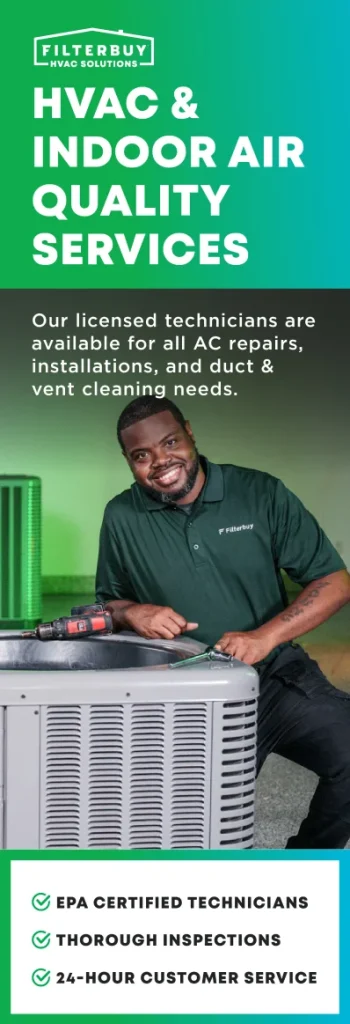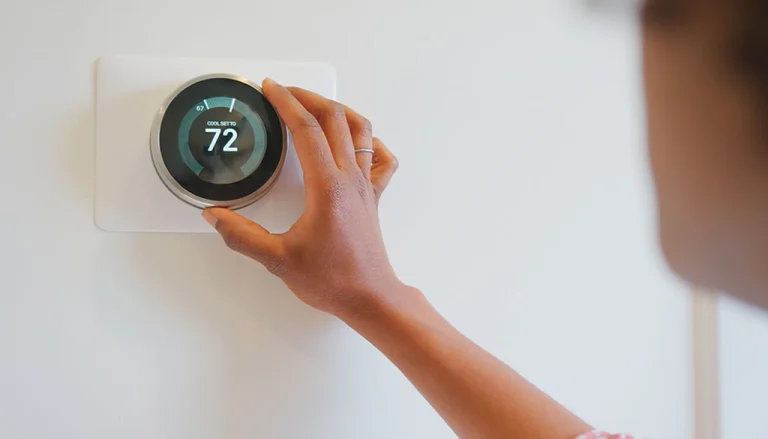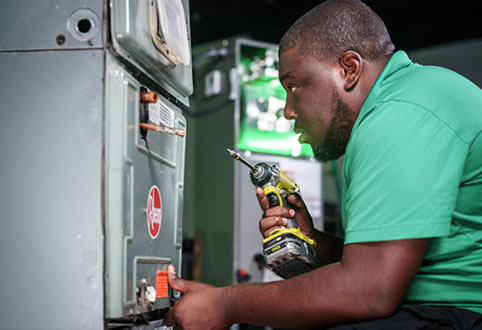Many homeowners worry the moment they see aux heat on their thermostat. Auxiliary heat is not a sign of failure. It is a backup system that helps your home stay warm when your heat pump needs extra support. This guide explains what it means. Also answers when it’s normal and when to get professional help.
Top Takeaways
- Auxiliary heat is a backup feature, not a problem.
- It turns on when your heat pump struggles in cold weather.
- Overuse increases energy bills and wears out parts faster.
- Regular HVAC maintenance prevents most aux heat issues.
- Call Filterbuy HVAC Solutions if your system runs aux heat too often.
How Auxiliary Heat Works
Many homeowners ask, “What does auxiliary heat mean?”. It is the secondary heating source built into your system. The heat pump does most of the work. They move heat from the outside air into your home. If the air outside becomes too cold, the electric heating elements inside your air handler switch on to help.
Occasional activation during freezing weather or after a large thermostat change is normal. The problem arises when the aux on the thermostat stays on for hours or activates on mild days. Constant use may indicate airflow issues, thermostat errors or other maintenance needs. Understanding aux heat meaning helps you know when your system is doing its job or signaling a problem.
Common Reasons Auxiliary Heat Activates
Your thermostat says aux heat on under certain conditions:
- Outdoor temperatures drop below what your heat pump handles efficiently.
- Rapid thermostat changes request a large temperature jump.
- Heat pump cannot meet the set temperature on its own.
Occasional activation is normal. Continuous or unnecessary use usually requires professional inspection.
When Aux Heat Becomes a Problem
Homeowners often ask, “Is aux heat bad?”. It is safe when used occasionally. Problems appear when it becomes the main heating source.
Overuse can lead to:
- Higher electricity bills – Aux heat uses more power than the heat pump alone.
- Faster wear and tear – Overworked parts fail sooner.
- Frequent maintenance – Systems require repairs more often.
Warning signs include:
- High energy bills despite normal use.
- System running constantly without reaching the set temperature.
- Ice forming on the outdoor unit. This may indicate a refrigerant, fan or defrost problem.
Check air filters and make sure airflow is clear. Keep thermostat settings steady. Avoid frequent large temperature jumps. Persistent aux heat use usually requires professional service to prevent higher energy bills and system wear.
Supporting Statistics
Auxiliary heat impacts energy use and costs. Research shows:
- Heat pumps use up to 50% less electricity than furnaces or baseboard heaters when running normally (energy.gov).
- Families save $300–$1,500 yearly with efficient heat pump use (energy.gov).
- Reducing unnecessary aux heat could prevent 160 million metric tons of CO₂ annually—the same as removing 32 million cars from the road (rewiringamerica.org).
Proper system use saves money and helps the environment.
Why Choose Filterbuy HVAC Solutions
Filterbuy HVAC Solutions provides local families with reliable heating services and honest system checks. Our technicians keep heat pumps efficient and inspect components that affect aux heat use.
We also design and maintain ductwork. We make sure it balances airflow and improves comfort. Proper duct sizing saves energy. It also lowers strain on your AC and prolongs its life. Our experienced team handles Florida’s tight and hot attics carefully. We ensure efficient installations and optimal system performance.
Scheduling professional service with Filterbuy HVAC Solutions helps reduce unnecessary aux heat, lower energy bills, and keep your system running efficiently.
Final Thoughts
Auxiliary heat is your system’s backup, not a warning sign. Short bursts during cold weather are normal. Constant use signals a system issue.
Change filters regularly, avoid sudden thermostat changes, and schedule seasonal maintenance. Filterbuy HVAC Solutions is here to help keep your system efficient, your energy bills lower, and your home comfortable all winter.
Frequently Asked Questions About Auxiliary Heat
What does it mean when my thermostat shows “Aux Heat”?
The term means your system’s backup heat has turned on. It happens when your heat pump needs help to warm your home fast or when outdoor temperatures drop very low. This is what thermostat auxiliary heat what does that mean — it’s normal and helps your system maintain comfort.
Do I need to switch on auxiliary heat manually?
You don’t need to. The thermostat activates it automatically when your heat pump struggles to keep up. What is aux heat on my thermostat is simply the backup system doing its job during cold weather.
What is auxiliary heat in my HVAC system?
Auxiliary heat is your system’s backup heating source. It often uses electric coils that work when the heat pump alone can’t handle the demand. Homeowners often ask, what does heat on auxiliary mean, and it’s just your unit using extra power to reach the set temperature.
Does auxiliary heat cost more to run?
Yes. Auxiliary heat uses electric resistance heating, which consumes more energy. It’s best if it runs only when necessary, or you might notice higher energy bills.
Why does my auxiliary heat keep running too long?
A dirty air filter, blocked airflow, or poor maintenance often cause this. Replace your filter, keep thermostat settings steady, and schedule regular service. If it still runs nonstop, a technician should inspect it. They can check for refrigerant leaks or damaged parts.
Why is my thermostat showing “Aux Heat” all the time?
Your heat pump could be struggling to keep up. Common reasons include dirty filters, frozen coils, or low refrigerant levels. A professional can inspect and repair these issues quickly.
Does auxiliary heat make my power bill higher?
Yes. It uses more power than your regular heat pump. Try to limit how long it runs by keeping your system clean and well-maintained.
Is emergency heat more costly than auxiliary heat?
Yes. Emergency heat uses only electric elements and skips the heat pump. That makes it the most expensive mode to operate.
What if I accidentally turned on emergency heat?
You don’t need to worry. It won’t harm your system, but it’s less efficient. Turn it off once you notice, or your power bill might rise fast.
Does heating in general raise my power use?
Yes. Heating always uses more energy than cooling. A clean, tuned heat pump keeps costs lower than using electric-only heating.
Is it bad if auxiliary heat activates?
No, it’s not. Many ask, is it bad if auxiliary heat comes on, but it’s a normal part of the system. It only becomes an issue if “Aux Heat” stays on too long, which may point to a deeper problem.
Which uses more energy — auxiliary heat or emergency heat?
Emergency heat does. Auxiliary heat assists your heat pump, while emergency heat works alone. That makes it the least efficient option.






